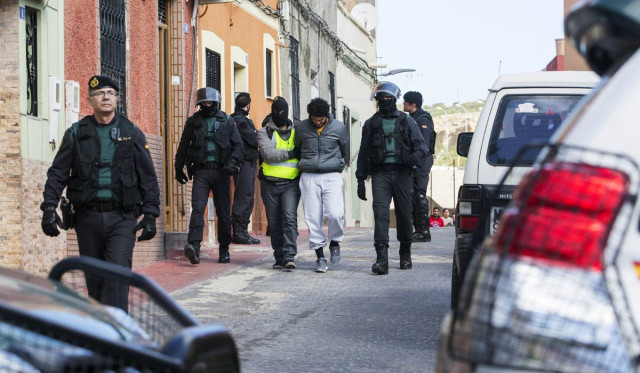Spain breaks up online network recruiting young women for IS
One of the members ran a virtual community with subscribers from Pakistan, Saudi Arabia, Tunisia, Turkey, US, France

One of four people suspected of creating and operating several Internet platforms spreading propaganda, particularly for the Islamic State group in a bid to recruit young women to join Islamic State militans is arrested in Melilla, the Spanish enclave neighbouring Morocco, on February 24, 2015. PHOTO: AFP
The early morning arrests came as European nations scramble to halt a surge in young people wanting to travel to Iraq and Syria to fight alongside the militants.
Two of the suspects were arrested in Melilla, the Spanish enclave neighbouring Morocco, in the latest operation by Spain's authorities targeting such recruiting networks.
The others were detained in Girona and Barcelona in Spain's northeastern region of Catalonia.
The two detained in Melilla were said to be behind the creation and operation of several Internet platforms spreading propaganda, particularly for the Islamic State group, the interior ministry said in a statement.
"In line with the strategy of the Daesh terrorist group, they focused on the recruitment of women who, after a process of indoctrination, would end up joining the terrorist group in conflict zones," it said, using the Arabic name for the group.
The ministry said private home visits were also organised for recruiting purposes and a number of young people had begun preparations for travel to war zones.
One of those arrested ran a "virtual community" with Islamic State propaganda and with more than 1,000 subscribers, it said. The suspect had a "multitude of subscribers" from outside of Spain on Facebook, including some from Latin America and countries such as Belgium, France, Morocco, Pakistan, Saudi Arabia, Tunisia, Turkey and the United States, the statement said.
One of the suspects arrested in Spain's northeast was described as an Islamic State sympathiser-turned-propagandist with the profile of a "lone wolf" who acted alone.
The other was said to have edited and distributed videos to recruit potential militants.
The authorities, who had searched the homes of all four suspects, were working to establish links between the two in Melilla and those in Spain's northeast.
Officers removed several boxes from the home of one of the men detained in Sant Vicenc dels Horts about 20 kilometres (14 miles) from Barcelona. Relatives of the man, a 36-year-old Moroccan who has lived in Spain since he was eight, said the boxes contained computers.
"It's a lie that he is a terrorist. It's all lies. For him, Islam is peace," the man's brother, Hicham Belkadar, 33, told journalists at the scene.
"They accuse him because he posted videos and shared photos. He published photos about Islam but it has nothing to do with terrorism. These people who cut heads don't represent Islam, and my brother is not one of them."
Spain has dismantled several similar networks, particularly in Melilla and its other north African enclave, Ceuta.
The two enclaves, with the only land borders between Africa and Europe, attract thousands of mostly sub-Saharan Africans trying to reach European countries.
An estimated 550 Western women are believed to have gone to Syria to join the jihadist cause, according to the London-based Institute for Strategic Dialogue.
Spanish authorities estimate that around 100 nationals have joined jihadist fighters in Iraq and Syria, a lower number than those from Britain, France and Germany.
In August two young Spanish women, one of them under 18, were arrested in Melilla on suspicion of trying to join an Islamic State cell in the Middle East.
Britain says some 500 people have travelled from the country to join militant groups, while France says about 1,400 residents have either joined the jihadist cause in Syria and Iraq or were planning to do so.
France on Monday announced that it had confiscated the passports of six suspected would-be militants and would ban another 40 from travelling.
Spain suffered one of Europe's worst ever peacetime attacks on March 11, 2004, when al Qaeda-inspired bombings killed 191 people in an attack on Madrid commuter trains.


















COMMENTS
Comments are moderated and generally will be posted if they are on-topic and not abusive.
For more information, please see our Comments FAQ